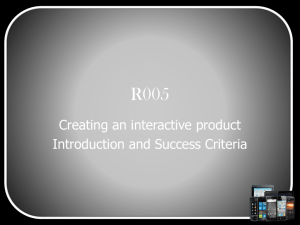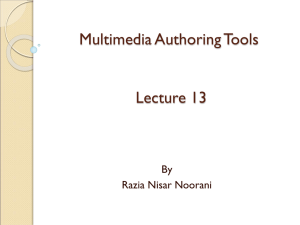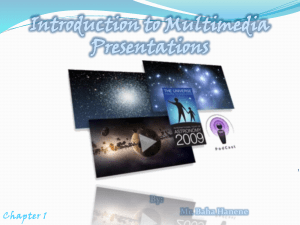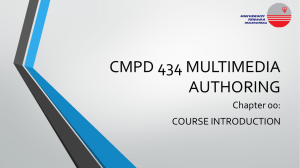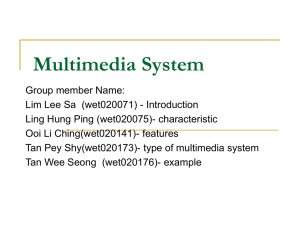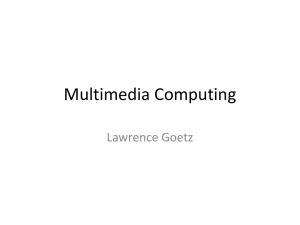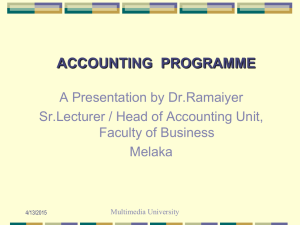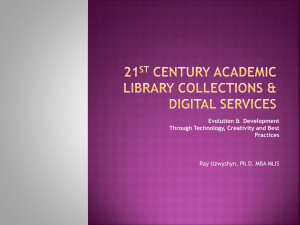STAGES OF DEVELOPMENT
advertisement
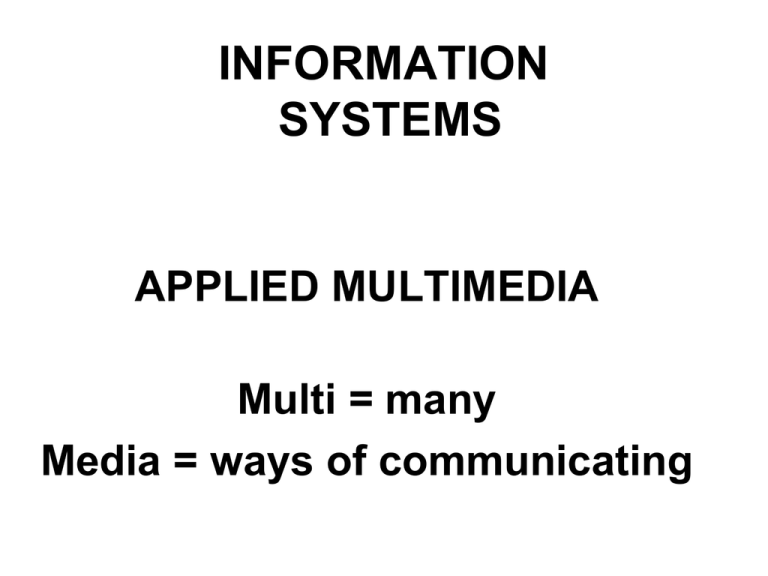
INFORMATION SYSTEMS APPLIED MULTIMEDIA Multi = many Media = ways of communicating Applied Multimedia The integrated use of • Text • Audio • Video • graphics CONTEMPORARY USES AND MEANS OF DELIVERY MULTIMEDIA APPLICATIONS Four main areas: • • • • Business (advertising, selling, presentations) Education (CAL, reference materials) Home (games, leisure pursuits) Public places (information points) DELIVERY MEDIA In multimedia, examples of appropriate uses of: • CD-ROM • DVD-ROM • Kiosk A computer designed to be an information point with a large hard disc and usually a touch screen – found in museums, airports, libraries etc • WWW COMPARISON OF DELIVERY MEDIA How do these 4 delivery media CD-ROM, DVD-ROM, Kiosk and WWW compare in terms of: • Data capacity • Ease of update EXAMPLES Stages of Development • • • • • • Analysis Design Implementation Testing Documentation (includes hardware & software) Evaluation STAGES OF DEVELOPMENT: ANALYSIS • • • • • • Purpose (of application) User / audience Content Delivery media Budget Timescale STAGES OF DEVELOPMENT: Design of Navigational Structures and HCI Navigational Structures: • Linear • Hierarchical • Web Complex search criteria (AND) STAGES OF DEVELOPMENT: Design of Navigational Structures and HCI DESCRIPTION OF USER INTERFACES • • • • Command Line Interface (MS-DOS) Menu type Form fill-in Graphical User Interface (MS Windows) STAGES OF DEVELOPMENT: Design of Screens and Media Elements Storyboard – a “graphical” way to represent many screens. Each screen is represented by a rectangle – don’t need to show all the text. Each storyboard should clearly show : • Layout – where all the elements will go on the page • Transitions – special effects used to move between screens. • The links between slides/screens – i.e. the Navigation. • Any item the user should interact with (menu, button to press etc) User interface Create a Storyboard Create a storyboard for a home page for the school website. The website should have the name and address of the school, a link to another page called Departments, the school logo, a photo of the school and the name of the head teacher. Font Times 24 Font Times 18 Paisley Grammar School Head Teacher: Mrs C. Amos School Address Photo of School Departments Hyperlink Logo Navigation Transitions Home Page Departments Departments Home Computing Maths Art Use Comb Vertical between Home Page and Departments Use Cover Left between Departments and Computing Use Cover Left between Departments and Maths Use Cover Left between Departments and Art Use Wipe Down between Computing and Home Use Wipe Down between Maths and Home Use Wipe Down between Art and Home Computing Maths Art Home Departments Home Departments Home Departments STAGES OF DEVELOPMENT: Design of Screens and Media Elements • • • • GENERAL DESIGN PRINCIPLES - Text Quantity of text and use of white space – don’t have too much text on one page. Use white space to break up the text. Fonts, alignment and size – Don’t keep changing the font. Be consistent. Make sure the size is big enough to read. Lists and tables – use lists and tables whenever possible. Headings / subheadings – be consistent with font, alignment and size. Subheadings should be smaller than main headings. STAGES OF DEVELOPMENT: Design of Screens and Media Elements GENERAL DESIGN PRINCIPLES - Graphics • Number of graphics on each screen – don’t have too many. • Position of graphics on screen and text wrap – text and graphics should look good together. • Captions – may be needed to explain the graphic. • Aesthetic considerations – make it look nice! STAGES OF DEVELOPMENT: Design of Screens and Media Elements GENERAL DESIGN PRINCIPLES - Audio • Use sound effects effectively (eg when answering a question) • Use background music when it adds to the application. (Will take up lots of storage space.) • Have voice output if relevant. (accessibility issue – to allow visually impaired people to access the software) • Have user-controlled volume if possible. Create a storyboard for a page on a website that allows users to play a video clip. The page should have an area for the Video (to see it play), and buttons for play, pause, stop, next chapter. The page should also have a heading showing the name of the video and an image at the side showing a poster for the video. There also should be a link back to the home page. http://www.ict.stmargaretsacademy.org.uk/ Movie Name Video Poster Video Play area Home page Play Pause Fast forward Stop Link to home page 1. Name 2 good design principles used for including Graphics in a Multimedia page. Use of Text Wrap, Use of Captions, Limit number of graphics to 2 or 3 2. Give an advantage of including background music. Sets the mood or creates an atmosphere for the presentation or website. 3. Give a disadvantage of including background music. Can be distracting or annoying to user. 4. Suggest a software solution to 3. User has ability to turn music on or off or control volume. 5. Give 1 advantage of including Sound Effects in a presentation. Useful when user is interacting with the application e.g. if the user answers a question wrong the computer can give a response. STAGES OF DEVELOPMENT: General Implementation There are 4 types of software packages used to implement a multimedia application:• Presentation (powerpoint, prezi) • Multimedia Authoring – icon-based (iDVD, Flash) • Multimedia Authoring – scripting (javascript) • Web-page (Dreamweaver) Presentation • Mainly used for linear presentations in Business i.e. a series of slides played in sequence. • Can include text, sound, video, animation, graphics etc. • Can use transitions between slides • Can animate slide contents. Example Powerpoint, Prezi Multimedia Authoring Packages These types of packages have a more interactive HCI than Presentation packages. They are also more flexible and have more features. There are 2 types of MM Authoring Package: •Script Based •Icon Based Icon Based Multimedia Authoring An icon-based authoring application is built by placing icons (small pictures) on a flow chart (or just working with icons). It has an easy to follow structure. Script Based Multimedia Authoring Uses a programming language which is built into the package to write scripts. Scripts are placed on a timeline. This type of package is more powerful than icon-based packages. Writing scripts gives you more control over media elements. (More difficult to learn to use – need to know programming language) Web-page editors Used to create multimedia applications to be viewed on the WWW using browser software. Includes basic HTML editors to website managers that handle all aspects of web management. HTML editors require a knowledge of hypertext markup language. (html) Examples: Adobe Dreamweaver, Microsoft Expression Web, Microsoft Sharepont Designer Ease of Use • Presentation Very simple to use. Creating slides and adding media. • Authoring Icon based Easy to follow structure – dragging and dropping icons. • Authoring scripting Need to know programming to write scripts. • Web page Easy to use most web page editors – provides a WYSIWYG editor. HTML editors more difficult as need to know HTML. Cost • Presentation Not that expensive (e.g. around £100 mark or less). • Authoring Icon based Medium price – however professional packages more expensive. • Authoring scripting based Generally expensive software. (Around £600 - £1000) • Web page Wide range of prices depending on application. HTML editor almost free. Dreamweaver medium priced around £360. Summary Table Type of software Presenta tion Icon based authoring Script based authoring Web page creation Example Descriptio n Functions Features Ease of use Cost Programming requirements Do Quizzes Information Systems INT 2 Revision Quick Quizzes Applied Multimedia 13 and 15 1. Name 2 things to be considered in Analysis. Purpose, Timescale, Audience (User), Budget 2. Name 4 types of HCI. Command Line Interepreter, Menu, Form fill and GUI 3. Name 3 types of Navigation. Hierarchical, Linear, Web 4. Name 4 delivery media for a Multimedia application. DVD-ROM, CD-ROM, Kiosk, WWW 5. Name 4 types of Multimedia Software Presentation, Authoring Icon Based, Authoring Script based, Web Editor. 1. Give 2 advantages of using a presentation package. Not an expensive package. Simple to use and learn. 2. Give an advantage of using a Multimedia Authoring Script based package. Can create a more interactive Multimedia application, Writing scripts makes the application more powerful and flexible. 3. Give a 2 disadvantages of using a Multimedia Authoring Script based package. Need to have good programming skills and learn commands for writing scripts. Usually an expensive package to purchase. 4. Which other type of multimedia software may require some programming skills. Web editor – if writing HTML into a simple text editor to create a web page. STAGES OF DEVELOPMENT: General Implementation Presentation (powerpoint) Description – Functions & Features – Ease of use – Cost Programming requirements - STAGES OF DEVELOPMENT: General Implementation Authoring - icon-based (media blender) Description – Functions & Features – Ease of use – Cost Programming requirements - STAGES OF DEVELOPMENT: General Implementation Authoring - scripting (?) Description – Functions & Features – Ease of use – Cost Programming requirements - STAGES OF DEVELOPMENT: General Implementation Web-page (frontpage) Description – Functions & Features – Ease of use – Cost Programming requirements - STAGES OF DEVELOPMENT: General Implementation DESCRIPTION OF PERSONNEL There are various jobs available in the area of implementing a multimedia application. • • • • • • Project manager Multimedia designer Subject expert Media specialists (graphics, audio) Multimedia programmer Webmaster Project manager Overall responsibility for development of the multimedia project Managing the project on a day to day basis. Multimedia Designer Will design the content, screen layout and structure of the multimedia project. This person will draw the storyboards that design the layout of the various screens. Subject Expert This person will provide the content or information for the project subject. (e.g. if it is presentation on Dinosaurs they would be an expert on Dinosaurs and provide all the information) Media Specialist They are responsible for creating and editing the multimedia elements e.g. the Sound Files, Video files, Graphics Files etc. Could be Video engineers, audio engineers or animators or graphic designers. STAGES OF DEVELOPMENT: Implementation of media elements Graphics Each image is made up of pixels. The more pixels used, the clearer the image will be. The amount of pixels used is called the resolution and is measured in dots per inch (dpi). When more pixels are used, the size of the image file will increase. STAGES OF DEVELOPMENT: Implementation of media elements Graphics A black and white image only uses 2 colours. Colours are stored in bits. 2 colours only need 1 bit. 1 for black and 0 for white. Most images have more than 2 colours, so they need more than one bit. (8 bits gives 256 colours.) The number of bits used for the colours is called the colour depth. (The number of bits used for each pixel is the colour depth.) STAGES OF DEVELOPMENT: Implementation of media elements Graphics The bigger the colour depth the more colours you can have and the clearer the image will appear. The bigger the colour depth, the bigger the size of the image file. 1. State 3 ways of reducing the size of a graphics file. Reduce the Resolution, Reduce the colour depth and apply compression. 2. Explain what is meant by On-Line help. Help with the features of the software built into the software. 3. What is a foreign Key? A Key that is a Primary Key in another Table not a primary key in the table it is in. 4. What is the name of person in charge of budget and making targets in a Multimedia project? Project Manager 5. What is the job title of the person who would sketch the story boards for the various screens in a Multimedia project? Multimedia Designer 6. State the job title of the person who might prepare sound files to be used for a multimedia project. Media Specialist STAGES OF DEVELOPMENT: Implementation of media elements Audio Sound is stored as lots of individual samples. A sample is a small clip of sound. Thousands of samples are taken every second when capturing sound. The more samples taken per second the better the quality of the audio and the larger the size of the audio file. Sampling Rate SAMPLING RATE is the number of samples of sound taken per second when capturing sound. This could be 11,000 samples per second or 22,000 samples per second. The term hertz is used for “per second”, so audio sampling rate is written as 11,000 hertz or more usually as 11 Khz. Khz means Sampling Rate SAMPLING RATE is the number of samples of sound per second e.g. 11,000 Hertz. The higher the Sampling Rate: 1) The better the QUALITY of sound. 2) The bigger the file size. STAGES OF DEVELOPMENT: Implementation of media elements Audio Sounds are stored in bits. There are usually 8 bits or 16 bits for every sample. 8 bits gives 256 different sounds/notes. The number of bits used for the sounds is called the sampling depth (or sampling resolution). Sampling Depth Sampling depth This is the size of each sample measured in bits and this is usually either 8 bits or 16 bits. The higher the Sampling Depth: 1)The higher the quality of the sound file. 2)The larger the file size. STAGES OF DEVELOPMENT: Implementation of media elements Audio The bigger the sampling depth the more sounds/notes you can have and the clearer the audio will sound (better quality). The bigger the sampling depth, the bigger the size of the audio file. STAGES OF DEVELOPMENT: Implementation of media elements Compression to compress – to make smaller in size Multimedia files are often large because they contain graphic files and audio files. There are ways to compress graphic and audio files, without losing much quality, to save storage space. Smaller files are also transmitted quicker over the internet. (For audio files MP3 is the type of compression used.) In summary The quality and size of Graphic files is affected by: •Resolution (dpi) •Colour Depth (e.g. 24 bits) The quality and size of Sound files is affected by: •Sampling Rate •Sampling Depth Compression can be applied to both types of files to reduce the file size. STAGES OF DEVELOPMENT: Implementation of media elements Terms Many multimedia pages have nodes, links and anchors. • Node – an item of information (text box, image, whole page) • Link – address to go to • Anchor – the item you click on to jump to another page e.g. Text, Button. STAGES OF DEVELOPMENT: Testing Description of different tests: • Screen tests • Navigational tests STAGES OF DEVELOPMENT: Documentation • Hardware and software requirements • User instructions STAGES OF DEVELOPMENT: Documentation COPYRIGHT ISSUES • Copyright licences • Copyright, Design & Patents Act STAGES OF DEVELOPMENT: Evaluation • Fitness for purpose
